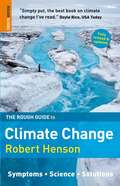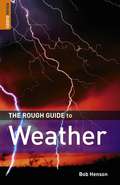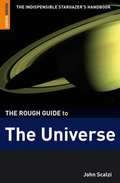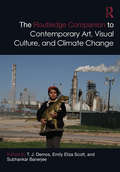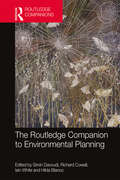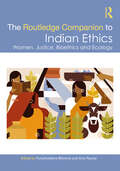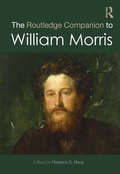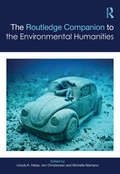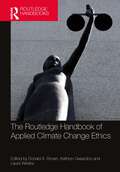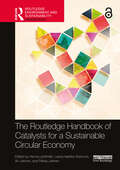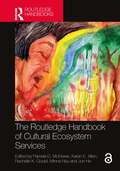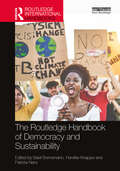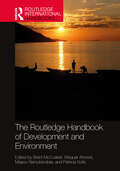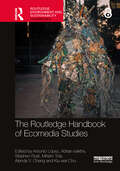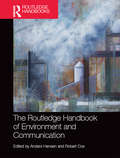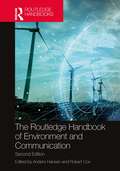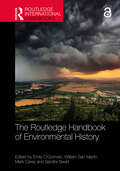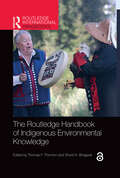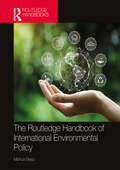- Table View
- List View
The Rough Guide to Climate Change
by Duncan Clark Robert HensonThe Rough Guide to Climate Change gives the complete picture of the single biggest issue facing the planet today. Cutting a swathe through scientific research and political debate, this completely updated 2nd edition lays out the facts and assesses the options- global and personal- for dealing with the threat of a warming world. The guide looks at the evolution of our atmosphere over the last 4.5 billion years and what computer simulations of climate change reveal about our past, present, and future. This updated edition includes new information from the 2007 report from the International Panel on Climate Change and an updated politics section to reflect post-Kyoto developments. Discover how rising temperatures and sea levels, plus changes to extreme weather patterns, are already affecting life around the world. The guide unravels how governments, scientists and engineers plan to tackle the problem and includes in-depth information and lifestyle tips about what you can do to help.
The Rough Guide to Weather
by Robert Henson"If warm air raises, why is Everest so cold?" The author of The Rough Guide to Climate Change provides a primer on weather-related phenomena and behind-the-scenes looks at how forecasts are made. Among the annotated resources listed in this update of the 2002 edition are special interest Websites and blogs, and government weather agencies worldwide. Annotation ©2008 Book News, Inc., Portland, OR (booknews.com)
The Rough Guide to the Universe (2nd edition)
by John ScalziWhether you're a novice or a more experienced astronomer, The Rough Guide to The Universe is indispensable. The truth may or may not be out there, but space is the place to look, and the Rough Guide to the Universe takes it all in, from our own moon to the furthest frontiers of the known universe - and then speculates about what lies beyond. This fascinating guide is not meant to delve too deeply; instead it gives the reader the grounding needed to appreciate the night sky. Clue-up on the basics with concise information on every planet in the solar system, and practical advice on observing the planets and stars with binoculars, telescopes and the naked eye. You'll find the latest theories about how the universe came to exist, incisive explanations of the formation of galaxies and weird concepts such a dark matter, wormholes and superstrings. The guide also provides travel-based information on planetariums, observatories and 'deep sky' sites as well as listings of star clubs, space news sources and other Internet resources. With dozens of photographs and star charts of every constellation, The Rough Guide to the Universe is the stargazer's essential handbook.
The Routledge Companion to Contemporary Art, Visual Culture, and Climate Change (Routledge Art History and Visual Studies Companions)
by Subhankar Banerjee T. J. Demos Emily Eliza ScottInternational in scope, this volume brings together leading and emerging voices working at the intersection of contemporary art, visual culture, activism, and climate change, and addresses key questions, such as: why and how do art and visual culture, and their ethics and values, matter with regard to a world increasingly shaped by climate breakdown? Foregrounding a decolonial and climate-justice-based approach, this book joins efforts within the environmental humanities in seeking to widen considerations of climate change as it intersects with social, political, and cultural realms. It simultaneously expands the nascent branches of ecocritical art history and visual culture, and builds toward the advancement of a robust and critical interdisciplinarity appropriate to the complex entanglements of climate change. This book will be of special interest to scholars and practitioners of contemporary art and visual culture, environmental studies, cultural geography, and political ecology.
The Routledge Companion to Environmental Planning (Routledge International Handbooks)
by Simin Davoudi Richard Cowell Iain White Hilda BlancoThis Companion presents a distinctive approach to environmental planning by: situating the debate in its social, cultural, political and institutional context; being attentive to depth and breadth of discussions; providing up-to-date accounts of the contemporary practices in environmental planning and their changes over time; adopting multiple theoretical and analytical lenses and different disciplinary approaches; and drawing on knowledge and expertise of a wide range of leading international scholars from across the social science disciplines and beyond. It aims to provide critical reviews of the state-of-the-art theoretical and practical approaches as well as empirical knowledge and understandings of environmental planning; encourage dialogue across disciplines and national policy contexts about a wide range of environmental planning themes; and, engage with and reflect on politics, policies, practices and decision-making tools in environmental planning. The Companion provides a deeper understanding of the interdependencies between the themes in the four parts of the book (Understanding ‘the environment’, Environmental governance, Critical environmental pressures and responses, and Methods and approaches to environmental planning) and its 37 chapters. It presents critical perspectives on the role of meanings, values, governance, approaches and participations in environmental planning. Situating environmental planning debates in the wider ecological, political, ethical, institutional, social and cultural debates, it aims to shine light on some of the critical journeys that we have traversed and those that we are yet to navigate and their implications for environmental planning research and practice. The Companion provides a reference point mapping out the terrain of environmental planning in an international and multidisciplinary context. The depth and breadth of discussions by leading international scholars make it relevant to and useful for those who are curious about, wish to learn more, want to make sense of, and care for the environment within the field of environmental planning and beyond.
The Routledge Companion to Indian Ethics: Women, Justice, Bioethics and Ecology
by Purushottama Bilimoria Amy RaynerThis companion volume focuses on the application and practical ramifications of Indian ethics. Here Indian dharma ethics is moved from its preeminent religious origins and classical metaethical proclivity to, what Kant would call, practical reason – or in Aristotle’s poignant terms, ēhikos and phronēis –and in more modern parlance normative ethics. Our study examines a wide range of social and normative challenges facing people in such diverse areas as women’s rights, infant ethics, politics, law, justice, bioethics and ecology. As a contemporary volume, it builds linkages between existing theories and emerging moral issues, problems and questions in today’s India in the global arena. The volume brings together contributions from some 40 philosophers and contemporary thinkers on practical ethics, exploring both the scope and boundaries or limits of ethics as applied to everyday and real-life concerns and socio-economic challenges facing India in the context of a troubled globalizing world. As such, this collection draws on multiple forms of writing and research, including narrative ethics, interviews, critical case studies and textual analyses.The book will be of interest to scholars, researchers and students of Indian philosophy, Indian ethics, women and infant issues, social justice, environmental ethics, bioethics, animal ethics and cross-cultural responses to dominant Western moral thought. It will also be useful to researchers working on the intersection of Gandhi, sustainability, ecology, theology, feminism, comparative philosophy and dharma studies.
The Routledge Companion to Joseph Conrad (Routledge Literature Companions)
by Debra Romanick BaldwinThe Routledge Companion to Joseph Conrad attests to the global significance and enduring importance of Conrad’s works, reception, and legacy.This volume brings together an international roster of scholars who consider his works in relation to biography, narrative, politics, women’s studies, comparative literature, and other forms of art. They offer approaches as diverse as re-examining Conrad’s sea voyages using newly available digital materials, analyzing his archipelagic narrative techniques, applying Chinese philosophy to Lord Jim, interrogating gendered epistemology in the neglected story “The Tale,” considering Conrad alongside W.E.B. Du Bois, Graham Greene, Virginia Woolf, or Orhan Pamuk, or alongside sound, gesture, opera, graphic novels, or contemporary events.An invaluable resource for students and scholars of Conrad and twentieth-century literature, this groundbreaking collection shows how Conrad’s works – their artistry, vision, and ideas – continue to challenge, perplex, and delight.
The Routledge Companion to William Morris (Routledge Art History and Visual Studies Companions)
by Florence S. BoosWilliam Morris (1834–96) was an English poet, decorative artist, translator, romance writer, book designer, preservationist, socialist theorist, and political activist, whose admirers have been drawn to the sheer intensity of his artistic endeavors and efforts to live up to radical ideals of social justice. This Companion draws together historical and critical responses to the impressive range of Morris’s multi-faceted life and activities: his homes, travels, family, business practices, decorative artwork, poetry, fantasy romances, translations, political activism, eco-socialism, and book collecting and design. Each chapter provides valuable historical and literary background information, reviews relevant opinions on its subject from the late-nineteenth century to the present, and offers new approaches to important aspects of its topic. Morris’s eclectic methodology and the perennial relevance of his insights and practice make this an essential handbook for those interested in art history, poetry, translation, literature, book design, environmentalism, political activism, and Victorian and utopian studies.
The Routledge Companion to William Morris (Routledge Art History and Visual Studies Companions)
by Florence S. BoosWilliam Morris (1834–96) was an English poet, decorative artist, translator, romance writer, book designer, preservationist, socialist theorist, and political activist, whose admirers have been drawn to the sheer intensity of his artistic endeavors and efforts to live up to radical ideals of social justice. This Companion draws together historical and critical responses to the impressive range of Morris’s multi-faceted life and activities: his homes, travels, family, business practices, decorative artwork, poetry, fantasy romances, translations, political activism, eco-socialism, and book collecting and design. Each chapter provides valuable historical and literary background information, reviews relevant opinions on its subject from the late-nineteenth century to the present, and offers new approaches to important aspects of its topic. Morris’s eclectic methodology and the perennial relevance of his insights and practice make this an essential handbook for those interested in art history, poetry, translation, literature, book design, environmentalism, political activism, and Victorian and utopian studies.
The Routledge Companion to the Environmental Humanities (Routledge Literature Companions)
by Jon Christensen Ursula K. Heise Michelle NiemannThe Routledge Companion to the Environmental Humanities provides a comprehensive, transnational, and interdisciplinary map to the field, offering a broad overview of its founding principles while providing insight into exciting new directions for future scholarship. Articulating the significance of humanistic perspectives for our collective social engagement with ecological crises, the volume explores the potential of the environmental humanities for organizing humanistic research, opening up new forms of interdisciplinarity, and shaping public debate and policies on environmental issues. Sections cover: The Anthropocene and the Domestication of Earth Posthumanism and Multispecies Communities Inequality and Environmental Justice? Decline and Resilience: Environmental Narratives, History, and Memory Environmental Arts, Media, and Technologies The State of the Environmental Humanities The first of its kind, this companion covers essential issues and themes, necessarily crossing disciplines within the humanities and with the social and natural sciences. Exploring how the environmental humanities contribute to policy and action concerning some of the key intellectual, social, and environmental challenges of our times, the chapters offer an ideal guide to this rapidly developing field.
The Routledge Handbook of Applied Climate Change Ethics (Routledge Handbooks in Applied Ethics)
by Laura Westra Donald A. Brown Kathryn GwiazdonThe Routledge Handbook of Applied Climate Change Ethics is a powerful reference source for the identification and exploration of the underlying ethical issues in climate change law and policy. Bridging theory with practice, it takes ethical engagement out of the classroom and into the halls of governance. The Handbook‘s 39 chapters--written by a diverse and inter-disciplinary team of experts from around the world--are case studies divided into five parts. Parts I-IV highlight the ethical issues that arise in climate change policy formation, from duties not to harm to duties to consider the views and voices of those who will be, or are being, harmed; from the role of human rights, justice, and democracy to how to identify and respond to disinformation and denialism. It also raises the ethics of various policy responses, such as cap-and-trade, carbon taxing, and geo-engineering. Part V offers a way forward, with strategies on how to expressly consider ethics in climate change policy formation, from negotiations to education, media, communication, and the power and potential of shaming. The volume is essential reading for students, professors, and practitioners who wish to better engage with government and non-government organizations on climate policy, to better understand the practical application of the theory and philosophy of ethics, and how to more strongly draft and defend ethical action in negotiating, drafting, and defending climate change law and policy.
The Routledge Handbook of Catalysts for a Sustainable Circular Economy (Routledge Environment and Sustainability Handbooks)
by Ari Jokinen Hanna Lehtimäki Leena Aarikka-Stenroos Pekka JokinenThis groundbreaking handbook leads the way in accelerating the transition to a sustainable circular economy by introducing the concept of a catalyst as a positive and enhancing driving force for sustainability. Catalysts create and maintain favourable conditions for complex systemic sustainability transition changes, and a discussion and understanding of catalysts is required to move from a linear economy to a sustainable and circular economy. With contributions from leading experts from around the globe, this volume presents theoretical insights, contextualised case studies, and participatory methodologies, which identify different catalysts, including technology, innovation, business models, management and organisation, regulation, sustainability policy, product design, and culture. The authors then show how these catalysts accelerate sustainability transitions. As a unique value to the reader, the book brings together public policy and private business perspectives to address the circular economy as a systemic change. Its theoretical and practical perspectives are coupled with real-world case studies from Finland, Italy, China, India, Nigeria, and others to provide tangible insights on catalysing the circular economy across organisational, hierarchical, and disciplinary boundaries. With its broad interdisciplinary and geographically diverse scope, this handbook will be a valuable tool for researchers, academics, and policy-makers in the fields of circular economy, sustainability transitions, environmental studies, business, and the social sciences more broadly.
The Routledge Handbook of Catalysts for a Sustainable Circular Economy (Routledge Environment and Sustainability Handbooks)
by Ari Jokinen Hanna Lehtimäki Leena Aarikka-Stenroos Pekka JokinenThis groundbreaking handbook leads the way in accelerating the transition to a sustainable circular economy by introducing the concept of a catalyst as a positive and enhancing driving force for sustainability. Catalysts create and maintain favourable conditions for complex systemic sustainability transition changes, and a discussion and understanding of catalysts is required to move from a linear economy to a sustainable and circular economy.With contributions from leading experts from around the globe, this volume presents theoretical insights, contextualised case studies, and participatory methodologies, which identify different catalysts, including technology, innovation, business models, management and organisation, regulation, sustainability policy, product design, and culture. The authors then show how these catalysts accelerate sustainability transitions. As a unique value to the reader, the book brings together public policy and private business perspectives to address the circular economy as a systemic change. Its theoretical and practical perspectives are coupled with real-world case studies from Finland, Italy, China, India, Nigeria, and others to provide tangible insights on catalysing the circular economy across organisational, hierarchical, and disciplinary boundaries.With its broad interdisciplinary and geographically diverse scope, this handbook will be a valuable tool for researchers, academics, and policy-makers in the fields of circular economy, sustainability transitions, environmental studies, business, and the social sciences more broadly.The Open Access version of this book, available at http://www.taylorfrancis.com, has been made available under a Creative Commons Attribution-Non Commercial-No Derivatives (CC-BY-NC-ND) 4.0 license.
The Routledge Handbook of Cultural Ecosystem Services
by Jun He Pamela D. McElwee Karen E. Allen Rachelle K. Gould Minna HsuThe Routledge Handbook of Cultural Ecosystem Services provides an overview of Cultural Ecosystem Services (CES), which are the nonmaterial aspects of benefits that people derive from nature. These diverse and multifaceted contributions can include experiences, capabilities, and identities, among others. The Handbook addresses how these CES are valued, how they reflect human-nonhuman relationships, and what roles they can play in improved human well-being, ecosystem management, and trajectories towards sustainability.This Handbook presents a wide array of perspectives on the roles CES can play in understanding relationships to nature, and on how those relationships might translate into policy. The Handbook includes philosophical approaches to CES, typologies and classifications of types of CES, and case studies of places, people, policies and projects engaging CES. Across seven distinctive Parts, the chapters deliver a number of important practical lessons on how to understand, measure, and value CES, and use examples and applications from around the world, including how CES apply across different biomes. The Handbook also includes a selection of compelling artworks that represent CES in different cultural contexts. The 91 authors represent 19 different countries, providing a rich range of experiences, including a strong focus on the Global South.This book can serve as a comprehensive guide to researchers who are new to CES and wish to understand more about the field, and as a set of go-to instructions for experienced CES researchers. It can also inform policymakers who wish to better incorporate CES into their work.The Open Access version of this book, available at http://www.taylorfrancis.com, has been made available under a Creative Commons Attribution-Non Commercial-No Derivatives (CC BY-NC-ND) 4.0 license
The Routledge Handbook of Democracy and Sustainability (Routledge Environment and Sustainability Handbooks)
by Basil BornemannThis handbook provides comprehensive and critical coverage of the dynamic and complex relationship between democracy and sustainability in contemporary theory, discourse, and practice. Distinguished scholars from different disciplines, such as political science, sociology, philosophy, international relations, look at the present state of this relationship, asking how it has evolved and where it is likely to go in the future. They examine compatibilities and tensions, continuities and changes, as well as challenges and potentials across theoretical, empirical and practical contexts. This wide-spanning collection brings together multiple established and emerging viewpoints on the debate between democracy and sustainability which have, until now, been fragmented and diffuse. It comprises diverse theoretical and methodological perspectives discussing democracy’s role in, and potential for, coping with environmental issues at the local and global scales. This handbook provides a comprehensive overview of arguments, claims, questions, and insights that are put forward regarding the relationship between democracy and sustainability. In the process, it not only consolidates and condenses, but also broadens and captures the many nuances of the debate. By showing how theoretical, empirical and practical accounts are interrelated, focusing on diverse problem areas and spheres of action, it serves as a knowledge source for professionals who seek to develop action strategies that do justice to both sustainability and democracy, as well as providing a valuable reference for academic researchers, lecturers and students.
The Routledge Handbook of Development and Environment (Routledge International Handbooks)
by Maano Ramutsindela Waquar Ahmed Brent McCusker Patricia SolísThe handbook seeks to illuminate the key concepts in the study of development-environment through showcasing some of the Majoritarian (formerly "Developing") world’s emerging scholars in order to explore theoretical connections through critical/radical theory, “small” theory, various conceptual frameworks, and non-Western and subaltern viewpoints. The volume examines the themes around the study of the relationship between economic and social development and the environment. Part 1 covers theoretical and conceptual approaches to the study of development and environment by examining the diverse ways in which people perceive, understand, and act upon the world around them. Cross-scalar topics such as neo-liberalism and globalization, human rights, climate change, sustainability, and technology are covered in Part 2. The book shifts to examinations of resources and production in Part 3, where authors with a focus on one or more environmental resources or types of economic production are presented. Topics range from water, agriculture, and food, to energy, bioeconomy, and mining. The fourth section presents chapters where people are at the center of the development-environment nexus through topics such as gender relations, children, health, and cities. Finally, policy and governance of development and environment are explored in Part 5. The section includes both academics and practitioners who have worked with policy makers and are policy makers themselves. The book is primarily intended for scholars and graduate students in geography, environmental studies, and development studies for whom it will provide an invaluable and up-to-date guide to current thinking across the range of disciplines, which converge in the study of development and environment.
The Routledge Handbook of Ecomedia Studies (Routledge Environment and Sustainability Handbooks)
by Miriam Tola Stephen Rust Adrian Ivakhiv Alenda Y. Chang Antonio López Kiu-Wai ChuThe Routledge Handbook of Ecomedia Studies gathers leading work by critical scholars in this burgeoning field. Redressing the lack of environmental perspectives in the study of media, ecomedia studies asserts that media are in and about the environment, and environments are socially and materially mediated.The book gives form to this new area of study and brings together diverse scholarly contributions to explore and give definition to the field. The Handbook highlights five critical areas of ecomedia scholarship: ecomedia theory, ecomateriality, political ecology, ecocultures, and eco-affects. Within these areas, authors navigate a range of different topics including infrastructures, supply and manufacturing chains, energy, e-waste, labor, ecofeminism, African and Indigenous ecomedia, environmental justice, environmental media governance, ecopolitical satire, and digital ecologies. The result is a holistic volume that provides an in-depth and comprehensive overview of the current state of the field, as well as future developments.This volume will be an essential resource for students, educators, and scholars of media studies, cultural studies, film, environmental communication, political ecology, science and technology studies, and the environmental humanities.The Open Access version of this book, available at www.taylorfrancis. com, has been made available under a Creative Commons Attribution-Non Commercial-No Derivatives (CC-BY-NC-ND) 4.0 license. Deep gratitude for the generous support of those institutions that provided funding to enable this volume to be available simultaneously in print and open access: University of Oregon Libraries Open Access Publishing Award, Frank J. Guarini School of Busi-ness at John Cabot University, University of Vermont Humanities Center, University of California Santa Barbara, University of Lausanne, and School of Humanities at Nanyang Technological University.
The Routledge Handbook of Environment and Communication
by Anders Hansen Robert CoxThis Handbook provides a comprehensive statement and reference point for theory, research and practice with regard to environment and communication, and it does this from a perspective which is both international and multi-disciplinary in scope. Offering comprehensive critical reviews of the history and state of the art of research into the key dimensions of environmental communication, the chapters of this handbook together demonstrate the strengths of multi-disciplinary and cross-disciplinary approaches to understanding the centrality of communication to how the environment is constructed, and indeed contested, socially, politically and culturally. Organised in five thematic sections, The Routledge Handbook of Environment and Communication includes contributions from internationally recognised leaders in the field. The first section looks at the history and development of the discipline from a range of theoretical perspectives. Section two considers the sources, communicators and media professionals involved in producing environmental communication. Section three examines research on news, entertainment media and cultural representations of the environment. The fourth section looks at the social and political implications of environmental communication, with the final section discussing likely future trajectories for the field. The first reference Handbook to offer a state of the art comprehensive overview of the emerging field of environmental communication research, this authoritative text is a must for scholars of environmental communication across a range of disciplines, including environmental studies, media and communication studies, cultural studies and related disciplines.
The Routledge Handbook of Environment and Communication
by Anders HansenThis revised and fully updated second edition of the Routledge Handbook of Environment and Communication provides a state-of-the-art overview of environmental communication theory, practice and research. The momentous changes witnessed in the politics of the environment as well as in the nature of media and public communication in recent years have made the study and understanding of environmental communication ever more pertinent. This is reflected in this second edition, including a number of exciting new chapters concerned with: environmental communication in an age of misinformation and fake news; environmental communication, community and social transformation; environmental justice; and advances in methods for the analysis of mediated environmental communication.Signalling the key dimensions of public mediated communication, the Handbook is organised around five thematic parts: the history and development of the field of environmental communication research, the sources, communicators and media professionals involved in producing environmental communication, research on news, entertainment media and wider cultural representations of the environment, the social and political implications of environmental communication, and the likely future trajectories for the field. Written by leading scholars in the field, this authoritative text is a must for scholars and students of environmental communication across multiple subject areas, including environmental studies, media and communication studies, cultural studies and related disciplines.
The Routledge Handbook of Environmental History (Routledge International Handbooks)
by Mark Carey Sandra Swart Emily O’Gorman William San MartínThe Routledge Handbook of Environmental History presents a cutting-edge overview of the dynamic and ever-expanding field of environmental history. It addresses recent transformations in the field and responses to shifting scholarly, political, and environmental landscapes. The handbook fully and critically engages with recent exciting changes, contextualizes them within longer-term shifts in the field, and charts potential new directions for study. It focuses on five key areas: Theories and concepts related to changing considerations of social justice, including postcolonial, antiracist, and feminist approaches, and the field’s growing emphasis on multiple human voices and agencies. The roles of non-humans and the more-than-human in the telling of environmental histories, from animals and plants to insects as vectors of disease and the influences of water and ice, the changing theoretical approaches and the influence of concepts in related areas such as animal and discard studies. How changes in theories and concepts are shaping methods in environmental history and shifting approaches to traditional sources like archives and oral histories as well as experiments by practitioners with new methods and sources. Responses to a range of current complex problems, such as climate change, and how environmental historians can best help mitigate and resolve these problems. Diverse ways in which environmental historians disseminate their research within and beyond academia, including new modes of research dissemination, teaching, and engagements with stakeholders and the policy arena. This is an important resource for environmental historians, researchers and students in the related fields of political ecology, environmental studies, natural resources management and environmental planning. Chapters 9, 10 and 26 of this book are freely available as a downloadable Open Access PDF at http://www.taylorfrancis.com under a Creative Commons Attribution-Non Commercial-No Derivatives (CC-BY-NC-ND) 4.0 license.
The Routledge Handbook of Environmental History (Routledge International Handbooks)
by Mark Carey Sandra Swart Emily O’Gorman William San MartínThe Routledge Handbook of Environmental History presents a cutting-edge overview of the dynamic and ever-expanding field of environmental history. It addresses recent transformations in the field and responses to shifting scholarly, political, and environmental landscapes.The handbook fully and critically engages with recent exciting changes, contextualizes them within longer-term shifts in the field, and charts potential new directions for study. It focuses on five key areas: Theories and concepts related to changing considerations of social justice, including postcolonial, antiracist, and feminist approaches, and the field’s growing emphasis on multiple human voices and agencies. The roles of non-humans and the more-than-human in the telling of environmental histories, from animals and plants to insects as vectors of disease and the influences of water and ice, the changing theoretical approaches and the influence of concepts in related areas such as animal and discard studies. How changes in theories and concepts are shaping methods in environmental history and shifting approaches to traditional sources like archives and oral histories as well as experiments by practitioners with new methods and sources. Responses to a range of current complex problems, such as climate change, and how environmental historians can best help mitigate and resolve these problems. Diverse ways in which environmental historians disseminate their research within and beyond academia, including new modes of research dissemination, teaching, and engagements with stakeholders and the policy arena. This is an important resource for environmental historians, researchers and students in the related fields of political ecology, environmental studies, natural resources management and environmental planning.Chapters 9, 10 and 26 of this book are freely available as a downloadable Open Access PDF at http://www.taylorfrancis.com under a Creative Commons Attribution-Non Commercial-No Derivatives (CC-BY-NC-ND) 4.0 license.
The Routledge Handbook of Environmental Movements (Routledge International Handbooks)
by Marco Giugni Maria GrassoThis handbook provides readers with up-to-date knowledge on environmental movements and activism and is a reference point for international work in the field. It offers an assessment of environmental movements in different regions of the world, macrostructural conditions and processes underlying their mobilization, the microstructural and social-psychological dimensions of environmental movements and activism, and current trends, as well as prospects for environmental movements and social change. The handbook provides critical reviews and appraisals of the current state of the art and future development of conceptual and theoretical approaches as well as empirical knowledge and understanding of environmental movements and activism. It encourages dialogue across the disciplinary barriers between social movement studies and other perspectives and reflects upon the causes and consequences of citizens’ participation in environmental movements and activities. The volume brings historical studies of environmentalism, sociological analyses of the social composition of participants in and sympathizers of environmental movements, investigations by political scientists on the conditions and processes underlying environmental movements and activism, and other disciplinary inquiries together, while keeping a clear focus within social movement theory and research as the main lines of inquiry. The handbook is an essential guide and reference point not only for researchers but also for undergraduate and graduate teaching and for policymakers and activists.
The Routledge Handbook of Environmental Movements (Routledge International Handbooks)
by Marco Giugni Maria GrassoThis handbook provides readers with up-to-date knowledge on environmental movements and activism and is a reference point for international work in the field. It offers an assessment of environmental movements in different regions of the world, macrostructural conditions and processes underlying their mobilization, the microstructural and social-psychological dimensions of environmental movements and activism, and current trends, as well as prospects for environmental movements and social change.The handbook provides critical reviews and appraisals of the current state of the art and future development of conceptual and theoretical approaches as well as empirical knowledge and understanding of environmental movements and activism. It encourages dialogue across the disciplinary barriers between social movement studies and other perspectives and reflects upon the causes and consequences of citizens’ participation in environmental movements and activities. The volume brings historical studies of environmentalism, sociological analyses of the social composition of participants in and sympathizers of environmental movements, investigations by political scientists on the conditions and processes underlying environmental movements and activism, and other disciplinary inquiries together, while keeping a clear focus within social movement theory and research as the main lines of inquiry.The handbook is an essential guide and reference point not only for researchers but also for undergraduate and graduate teaching and for policymakers and activists.
The Routledge Handbook of Indigenous Environmental Knowledge (Routledge International Handbooks)
by Thomas F. Thornton Shonil A. BhagwatThis volume provides an overview of key themes in Indigenous Environmental Knowledge (IEK) and anchors them with brief but well-grounded empirical case studies of relevance for each of these themes, drawn from bioculturally diverse areas around the world. It provides an incisive, cutting-edge overview of the conceptual and philosophical issues, while providing constructive examples of how IEK studies have been implemented to beneficial effect in ecological restoration, stewardship, and governance schemes. Collectively, the chapters in the Routledge Handbook of Indigenous Environmental Knowledge cover Indigenous Knowledge not only in a wide range of cultures and livelihood contexts, but also in a wide range of environments, including drylands, savannah grassland, tropical forests, mountain landscapes, temperate and boreal forests, Pacific and Indian Ocean islands, and coastal environments. The chapters discuss the complexities and nuances of Indigenous cosmologies and ethno-metaphysics and the treatment and incorporation of IEK in local, national, and international environmental policies. Taken together, the chapters in this volume make a strong case for the potential of Indigenous Knowledge in addressing today’s local and global environmental challenges, especially when approached from a perspective of appreciative inquiry, using cross-cultural methods and ethical, collaborative approaches which limit bias and inappropriate extraction of IEK. The book is a guide for graduate and advanced undergraduate teaching, and a key reference for academics in development studies, environmental studies, geography, anthropology, and beyond, as well as anyone with an interest in Indigenous Environmental Knowledge.
The Routledge Handbook of International Environmental Policy
by Mahua BasuThis handbook is a one-stop, comprehensive guide to global initiatives for climate action. It examines policies to tackle climate change and the critical role various organizations play.The volume: Includes in-depth discussion of individual issues related to the environment Highlights global initiatives, negotiations, and international organizations responsible for climate action, protecting marine and freshwater environment, protecting atmosphere and climate, conserving biological diversity, chemicals and wastes management, environmental governance, safeguarding against warfare and disasters Debates on-ground implications of the international policies for the Global South Brings together case studies from across the world Presents a toolkit for environment practitioners to seek sustainable and practicable solutions to problems Includes suggested readings for researchers Brings together primary documents, supportive illustrations, graphs, and maps The handbook will be an essential reference for scholars and researchers of environmental studies, environmental policy and governance, sustainability and resilience. It will also be indispensable for policy makers, think tanks and NGOs.
